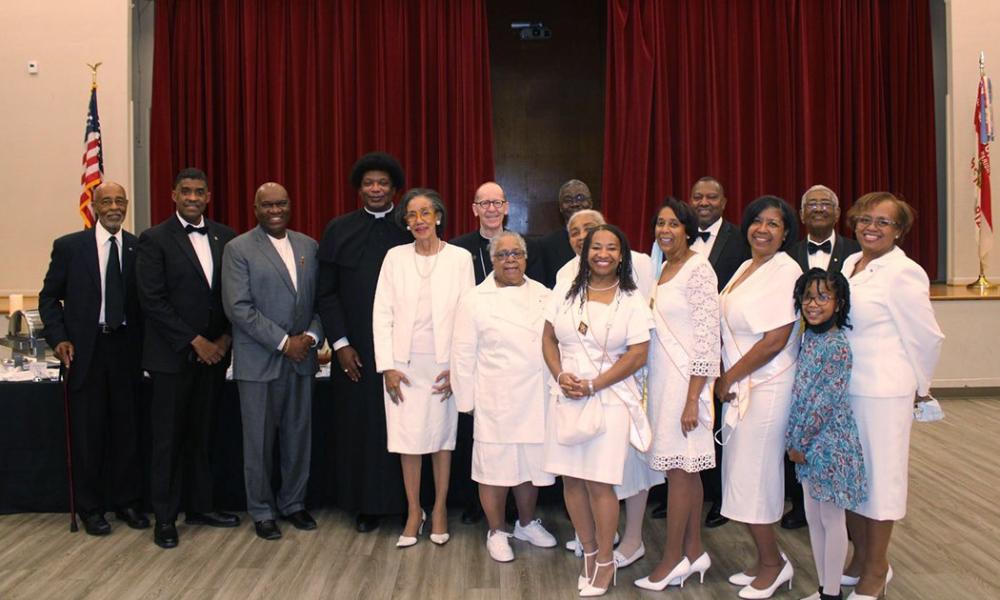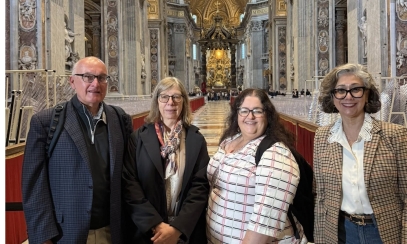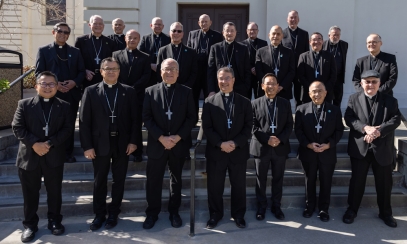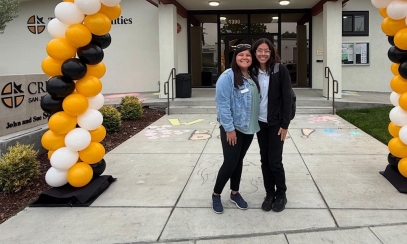
Catholic Church, Society Must Do More to Overcome Racism, Says Bishop
PHOENIX (CNS) -- Imagining what the Rev. Martin Luther King Jr., might say if he were alive today, retired Bishop Edward K. Braxton of Belleville, Illinois, delivered a homily in the voice of the slain civil rights leader to address how racism continues to impact the church and society as a whole.
The bishop was the guest homilist for the Diocese of Phoenix's annual memorial Mass for Rev. King celebrated Jan. 17 at Ss. Simon and Jude Cathedral.
Noting that Rev. King would have turned 93 Jan. 15, the bishop said the Baptist minister knew what it meant to follow Jesus' command to "Go and do likewise," from the parable of the good Samaritan that was the day's Gospel passage.
"Despite the undeniable and remarkable strides that have been made to bridge the racial divide in this country, the bloodstained headlines of almost every morning's newspaper make it clear how much we still need the voice and the deeds of this drum major for justice, this trumpeter for peace," said Bishop Braxton, one of 12 African American Catholic bishops.
"Yet, for many Americans -- and yes, for many American Catholics -- the murder of Dr. King means little more than a day off in January. He would surely say America is still learning who their neighbors are and what it means to go and do likewise."
Bishop Braxton briefly chronicled the history of the controversy surrounding Martin Luther King Day in Arizona, noting that it was the last state in the nation to make the day a paid holiday.
In 1983, President Ronald Reagan signed into law a measure declaring Martin Luther King Day a federal holiday to be observed every year on the third Monday of January. Before that, a number of states observed Rev. King's birthday as a state holiday.
Bishop Braxton praised the work of the Diocese of Phoenix's Office of Black Catholic Ministry and its "Let the Church Say AAMEN" initiative; "AAMEN" stands for the African American Ministry Evangelization Network.
Speaking as Rev. King, the bishop went on to quote the U.S. bishops' 2018 pastoral letter on racism, "Open Wide Our Hearts: The Enduring Call to Love," and its 1979 predecessor, "Brothers and Sisters to Us."
He asked if those letters are well-known in the diocese or if clergy refer to them from the pulpit. More directly, he asked if the faithful of the diocese were actively working to confront the sin of racism.
"Have parishioners and students in elementary schools, high schools and college been urged to study them, discuss them and to pray to act to overcome the sin of personal, structural and institutional racism here in your community with the same urgency as they are urged to discuss and pray and act to overcome the terrible sin of abortion?" he asked.
"How much direct social contact do the people of the Catholic Church have with people of different racial and ethnic backgrounds?" Bishop Braxton continued. "Do Catholics tend to live in self-contained separate -- even segregated -- worlds? Do African Americans, European Americans, Hispanic Americans, Asian Americans and Indigenous people have real, regular, personal social contact, or are their relationships superficial at best and strained at worst?"
The bishop noted the term "minority" itself can be demeaning because it identifies people as what they are not -- not of European ancestry -- rather than what they are. He compared the usage to how Catholics often refer to those of other traditions as non-Catholics rather than by what tradition they belong to.
"Why not call us what we are? We are Baptists and fellow Christians!" Bishop Braxton declared in the voice of Rev. King. "You might notice we never speak of you as non-Baptists -- why do you speak of us as non-Catholics?"
Noting that Rev. King's son, Martin Luther King III, was in Phoenix on his father's birthday to participate in a march and rally for voting rights, the bishop emphasized the fundamental right of every U.S. citizen to vote.
He referenced a recent U.S. Supreme Court decision that upheld two Arizona voting laws, including a ban on third-party ballot collecting. The court said Arizona did not violate section 2 of the Voting Rights Act, which enforces the constitutional guarantee that the right to vote cannot be abridged "on account of race, color, or previous condition of servitude."
"I fear that my granddaughter Yolanda will live to see the day in which the United States moves inch by careful inch back to an era not unlike the era of Jim Crow voting restrictions," the bishop said, still speaking as Rev. King.
"I know that your Catholic Church does not officially support any political party," he continued, "but as the great Karl Barth has taught us, we Christians must face the challenges of our time with the word of God in one hand and the morning newspaper in the other," he added, referencing the Swiss Calvinist ecumenist and theologian.
In his closing remarks for the liturgy, Phoenix Bishop Thomas J. Olmsted, who celebrated the Mass, thanked Bishop Braxton for a "very challenging homily."
The two bishops have known each other since they were both priests in residence at the Pontifical North American College in Rome during the mid-1980s.
Bishop Olmsted recalled studying the work of Rev. King when he took a six-month sabbatical at a monastery after returning from his priestly assignment in Rome.
"I discovered that he was very well formed in the dogma and in the moral teaching of St. Thomas Aquinas, so, he was really solid in his faith," the bishop recalled. He praised Rev. King's famed "Letter from Birmingham City Jail" for its scholarship.
"It's one that really is worth taking time to read because it shows his scholarship -- not because he's trying to flaunt his scholarship but because every time he quoted something, it really had substance," he said.
Supreme Knight Jim Ellis of the Knights of Peter Claver -- the only traditionally Black Catholic fraternal society in the U.S. -- attended the liturgy to show his support for the local Knights Council and Ladies Auxiliary Court 369. Ellis also advises the U.S. Conference of Catholic Bishops' Ad Hoc Committee on Racism.
"Our order was born out of a commitment to church, a commitment to our communities and being that good Samaritan," he said afterward, reflecting on the Knights' mission. "Most recently, social justice -- the idea that injustice anywhere is a threat to justice everywhere -- has been our focus."



